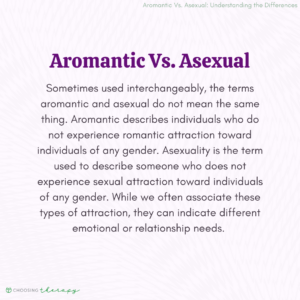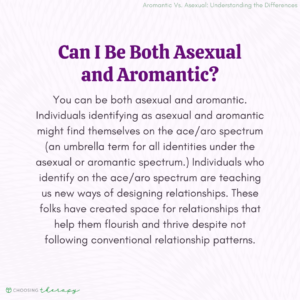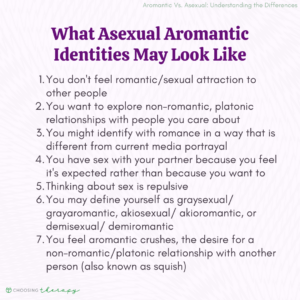Sometimes used interchangeably, the terms aromantic and asexual do not mean the same thing. Aromantic describes individuals who do not experience romantic attraction toward individuals of any gender. Asexuality is the term used to describe someone who does not experience sexual attraction toward individuals of any gender.1 While we often associate these types of attraction, they can indicate different emotional or relationship needs.
What Does it Mean to Be Aromantic?
You may identify as an aromantic, or Aro person, if you are someone who experiences sexual attraction to other individuals but doesn’t experience romantic interest.2 You might not be interested in having romantic relationships, but you might be potentially interested in having sexual relationships. The term aromantic falls under the umbrella of LGBTQIA+ romantic orientation identities, but whatever identity or label you choose is yours to own. In addition, each term contains a spectrum of identities.
You might identify as aromantic if:
- You don’t feel romantic attraction to other people
- You don’t desire romantic relationships with other people
- You are amenable to exploring non-romantic relationships with people you care about
- Your sexual desires might not come with a romantic interaction
- You are in or desire a queerplatonic relationship
- You might identify with romance in a way that is different from current media portrayal
What Does it Mean to Be Asexual?
Like other elements of sexuality, what it means to be asexual is personal; therefore, the answer will vary depending on the individual.
Consider the following statements to see where you might identify:
- Do you find other people sexy—in a way that makes you feel sexual desire or arousal, or a way that makes you think sex or sexual touching with that person would be satisfying? If you don’t feel this with anyone, you may be asexual.
- Do you develop sexual attraction occasionally but don’t find its pursuit or satisfaction rewarding? Some people would call that asexual.
- Do you think having sex (or the idea of having sex) is OK but not very interesting or important? Could you take it or leave it, and find leaving it more convenient or preferable? Some people would call that asexual.
Here are some other terms commonly used when discussing sexuality and asexuality you might want to consider:
- Sex-averse is a term used to describe a widespread, poorly recognized identity occurring in both males and females. Sexual aversion is characterized by an unwillingness to get involved in sexual activity.3 This is not intended to pathologize or ostracize those who identify as sex-averse but is simply a description.
- Sex-favorable is sometimes known instead as sex-positive. People who identify as asexual and sex-favorable may enjoy having sex. They may seek sexual relationships for many reasons. The key takeaway is this, too, can exist on a spectrum of sexuality.
- Sex-indifferent people sometimes prefer the term sex-neutral. Individuals who identify as sex-indifferent have no strong feelings about sex. Some individuals who identify as sex-neutral may have sex as part of giving pleasure to their partner or for reproduction. Like all other elements of sexuality, this is a personal identification and label, should you choose to use it.
Top Rated Online Therapy Services BetterHelp – Best Overall “BetterHelp is an online therapy platform that quickly connects you with a licensed counselor or therapist and earned 4 out of 5 stars.” Visit BetterHelp Talkspace – Online Counseling For the LGBTQIA+ Community See a licensed therapist who sees you! Covered by most insurance plans. Visit Talkspace
Asexual Vs. Aromantic: Similarities & Differences
The terms asexual and aromantic share some common elements. Both are personal identifications with many varying labels and details. We can experience attraction in many different ways. Two common types of attraction are romantic attraction, which is the attraction that makes people desire romantic contact or interaction with another person or person(s), and sexual attraction, which is the attraction that makes people desire sexual contact or show sexual interest in another person(s).
A person who identifies as aromatic might experience sexual but not romantic attraction; a person who identifies as asexual might experience romantic but not sexual attraction. In addition, there could be some overlap in individuals identifying as asexual or aromantic regarding relationships. For example, you may not desire a sexual or romantic relationship with a specific person.
The following are common aromantic or asexual descriptions:
- You grapple with imagining what it feels like to be in love
- It is a challenge to envision what lust feels like
- When other people talk about feeling sexually or romantically attracted to someone, you can’t relate
- You feel neutral or even repulsed by the idea of having sex or being in a romantic relationship
- You’re not sure if you only feel the need to have sex or be in relationships because that’s what is expected of you
People who identify as asexual or aromantic may experience some of the above-mentioned scenarios. Just remember, you don’t need to be in a relationship or want to be in a relationship to be happy.
Can I Be Both Asexual & Aromantic?
You can be both asexual and aromantic. Individuals identifying as asexual and aromantic might find themselves on the ace/aro spectrum (an umbrella term for all identities under the asexual or aromantic spectrum.)4 Individuals who identify on the ace/aro spectrum are teaching us new ways of designing relationships. These folks have created space for relationships that help them flourish and thrive despite not following conventional relationship patterns.2
What Asexual Aromantic Identities Look Like in Practice
If you identify as asexual and aromantic, you can decide what that looks like in real life. There are many ways to be ace/aro, and the identifying community is diverse. There are many ways to be happy in a relationship without sex or romantic feelings. Regardless of individual choices, all asexual/aromantic folks are valid in their identities. Some asexual people may want a romantic relationship or experience sexual attraction. Some may not. It depends on each individual. Like so many other elements of sexuality, you get to define, label, and own your identity.
If you’re both asexual and aromantic, you might identify with some of the following:
- You don’t feel romantic/sexual attraction to other people
- You don’t desire sexual or romantic relationships with other people
- You want to explore non-romantic, platonic relationships with people you care about
- Your sexual desires might not come with a romantic interaction
- You are in or desire a queerplatonic relationship
- You might identify with romance in a way that is different from current media portrayal
- You have sex with your partner because you feel it’s expected more than because you want to
- Thinking about sex is repulsive
- You have difficulty imagining what lust feels like
- You desire to create and utilize the label that describes their life experience
- You may define yourself as graysexual/grayaromantic, akiosexual/akioromantic, or demisexual/demiromantic
- You feel aromantic crushes, the desire for a non-romantic/platonic relationship with another person (also known as squish).1
Can I Be Aromantic But Not Asexual?
People can be aromantic but not asexual, meaning they don’t desire romantic connections but have sexual experiences. Sometimes we experience sexual and romantic attraction to the same individual(s) but not always. Individuals identifying as aromantic may still desire relationships and experiences with varied attractions to others.
Aromantic relationships might look like this:
- Queerplatonic relationships (QPRs) are relationships that are not romantic. Still, they can involve very close emotional connections that are often more intense than what is traditionally considered a friendship.1
Fun fact: Since there is inadequate language to describe queerplatonic partners, some people refer to these partners as zucchini.1 - Aromantic crushes; the desire for a non-romantic/platonic relationship with another person (also known as squish).1
Being true to oneself requires self-understanding and emotional strength. A therapist can help support your journey. BetterHelp has over 20,000 licensed therapists who provide convenient and affordable online therapy. BetterHelp starts at $65 per week. Take a Free Online Assessment and get matched with the right therapist for you.
Other Identities and Terms That Describe Asexual or Aromantic Identities
There are many terms to describe asexual or aromantic identities. Throughout your lifetime, you might embrace varied sexual identities. Sexuality is fluid, as is romantic attraction. The identity or label that resonates for you in one stage of your life might evolve into something different or related at another stage. Remember, your sexuality is yours to define, label, and own. Like other elements of sexuality, this may vary from person to person.
Here are some other terms that fall under the ace/aro spectrum that you might consider:
Demisexual / Demiromantic
Someone who identifies as demiromantic might not feel spontaneous romantic desire but might feel romantically attracted to someone once they have formed a prior bond with that person, such as a deep friendship or sexual relationship. You may be demisexual if your sexual attraction often follows emotional connectivity.
Graysexual / Grayromantic
People who identify as graysexual or grayromantic often engage in and enjoy sex, depending on their unique feelings and experiences. Sexologist Carol Queen, Ph.D., explains: “Graysexual people fall in a bit of a gray area in the way they experience sexual attraction—namely, they do experience sexual attraction but rarely or with low intensity.” You may be graysexual or grayromantic if this sounds like you! Remember, sexuality has many elements that exist on a continuum, so you can put yourself where you are comfortable.
Reciprosexual / Recipromantic
As its name suggests, reciprosexuality/reciproromantic is a term to describe if you feel attracted to another person after knowing they are attracted to you. Every reciprosexual/reciproromantic experience is unique to the person and can lead to varied sexual responses. For instance, some reciprosexual/reciproromantic people may not want to have sex, even after experiencing attraction to someone.
Aceflux / Aroflux
Aceflux and aroflux terms describe individuals who fluctuate between experiencing sexual or romantic attraction and not experiencing it and/or experiencing sexual/romantic interest to different strengths. Aro is an abbreviated term for ‘aromantic’; Ace is an abbreviated term for ‘asexual.’5 The individual force of the attraction could also fluctuate, going through phases of weakness and intensity.
Akiosexual / Akioromantic
A person who identifies as akioromantic feels romantic attraction but is uncomfortable when reciprocated. The term akiosexual (also called akionesexual and lithsexual) refers to a person who experiences sexual attraction but has their feelings fade if returned. Akiosexual can also be defined as someone who doesn’t care or want their feelings reciprocated.5
Is it OK to Not Have Sex?
As a society, we tend to focus on sex as an essential element of relationships. In addition, it’s used to sell almost everything. However, it is a legitimate choice if you don’t want to have sex. Suppose your partner pressures you or threatens to break up with you because you don’t want to have sex or do other sexual things. In that case, it’s a sign that you and your partner need to communicate about sex.
You don’t owe anyone — even someone you love — an explanation for why you don’t want to do what they want you to do. You can explain if you want, but you don’t have to. You can also tell them you care for or even love them, but you’re not interested in having sex.6
It is important to note that some asexual people do have sex and some masturbate, and others don’t want to do either. Sexuality and relationships are complex, and there are no easy answers. It’s not good or bad to have a high, a medium, or a low libido. It’s OK if you have no libido or need a solid emotional connection to feel sexual attraction.
Is it OK to Not Want to Be in a Relationship?
Although it is often deemed essential, many people do not need to be in a sexual or romantic relationship to experience happiness. Some people get their social support through friendships and family relationships. Many individuals who have been in or desired relationships previously are making a different choice now; some individuals have never wanted a romantic or sexual relationship. While it doesn’t matter why you might choose not to be in a romantic or sexual relationship, there are many widely shared reasons. It’s also OK if you don’t have a stated reason. It’s your sexuality, and you can define, label, and own your choice!
What are Queerplatonic Relationships?
Some people who identify as asexual prefer queerplatonic relationships, which are close friendships that aren’t romantic or sexual. In these relationships, the involved parties may choose to live together, raise children together, or share finances and responsibilities. Still, they don’t need to include physical intimacy, exclusivity, or romantic love. This type of relationship is not a 21st-century invention, even though the language is evolving.
For many who identify as asexual and/or aromantic, queerplatonic relationships offer a framework for relationships that allow for expressions of fidelity, co-parenting/cohabitating, and long-term commitment, depending on what the people in the relationship need and create together.
Where to Find Support
Do you have questions about your sexuality, including whether the terms aromantic or asexual resonate? In that case, there are many places to find support. Talking to safe friends or family can be an excellent way to hear validation for your thoughts. If the process of making these decisions causes you distress or you don’t have safe people to confide in, there are many LGBTQ+ online therapy options to give you that safe space. When you find a therapist that can support you, you can work through your feelings and discover your sexual and romantic identity.
Final Thoughts
Your sexuality is yours to explore, define, and label. Even though many other individuals will identify as aro/ace, it may look different for each person. Remember, like other elements of your sexuality, it may change over time and exist on a spectrum of normal and healthy sexual and romantic choices.
To help our readers take the next step in their mental health journey, Choosing Therapy has partnered with leaders in mental health and wellness. Choosing Therapy is compensated for marketing by the companies included below. Online Therapy BetterHelp Get support and guidance from a licensed therapist. BetterHelp has over 20,000 therapists, who provide convenient and affordable online therapy. Complete a brief questionnaire and get matched with the right therapist for you. Get Started Psychiatry, with you in mind Talkiatry Our Psychiatrists Can Diagnose Your Condition, Prescribe Medication, And Monitor Your Progress. Most psychiatry visits cost patients $30 or less* Free Assessment Drinking Moderation Sunnyside Want to drink less? Sunnyside helps you ease into mindful drinking at your own pace. Think lifestyle change, not a fad diet. Develop new daily routines, so you maintain your new habits for life. Take a 3 Minute Quiz Relationship Help OurRelationship (Free Couples Course) OurRelationship has been proven to help couples improve communication, intimacy, and trust. 94% would recommend it to a friend. Get Started Mental Health Support Group App Circles Anytime, anonymous, and free. Never feel alone during life’s greatest challenges. Drop-in to live conversations and share thoughts, ask questions, or learn from others on the same journey. Join Circles Now Mental Health Newsletter A free newsletter from Choosing Therapy for those interested in mental health, therapy and fighting stigma. Sent twice weekly. Sign Up Choosing Therapy Directory You can search for therapists by specialty, experience, insurance or price, and location. Find a therapist today. *Includes all types of patient cost: copayment, deductible, and coinsurance. Excludes no shows and includes $0 Visits.Additional Resources
For Further Reading
Online Anxiety Test A few questions from Talkiatry can help you understand your symptoms and give you a recommendation for what to do next. How Does ERP Help With Intrusive Thoughts? Obsessive compulsive disorder (OCD) is a psychiatric condition marked by the presence of obsessive thoughts, images, doubts, or urges, followed by compulsive behaviors or acts aimed at easing the distress caused by the obsession. While the content of the obsessions can take many forms, they are always repetitive, persistent, involuntary, and intrusive, and they often result in a great deal of anxiety for the person experiencing them.









